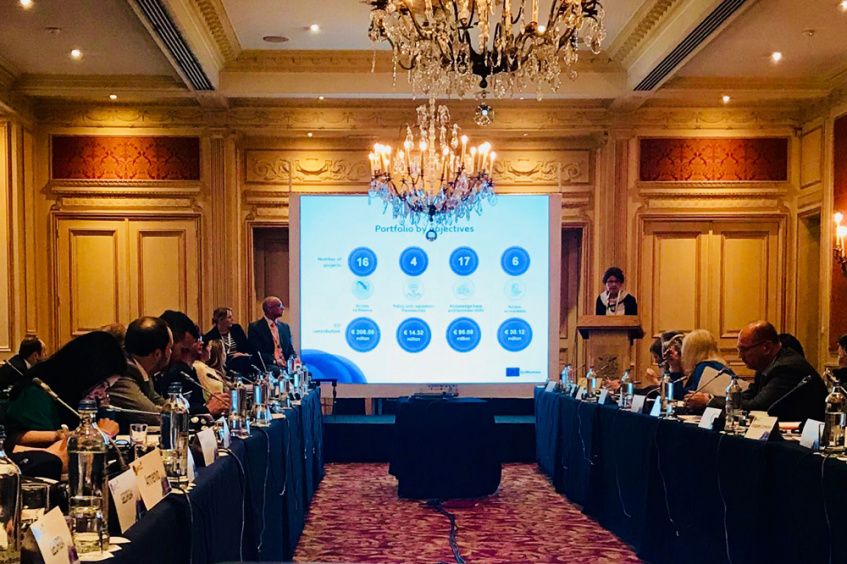
More than 10,000 SMEs in the Eastern Partnership countries received loans worth a total of over €593 million under EU4Business in the period 2016-17, and over 1,500 received advisory services, while almost 8,400 received training and more than 20,000 attended events organised under the initiative.
These are just some of the achievements highlighted in the 2018 EU4Business Annual Report presented by the initiative’s Secretariat in Brussels on 19 June 2018, during the Panel on ‘Structural reforms, Financial sector architecture, Agriculture and SMEs’ for the Eastern Partnership. The event was attended by some 60 programme stakeholders from all six EaP countries, DG NEAR and the EU4Business Secretariat.
EU4Business provided the focus for the morning session of the Panel, with the presentation of the report and a discussion on ways to improve the EaP business environment, with a focus on the investment climate.
EU4Business covers a portfolio of 43 projects with a total EU commitment of €348 million, implemented by 20 partners, and triggering a total of almost €2 billion of loans.
Presentation of achievements
The presentation of the report included an analysis of current achievements across all four objectives of EU4Business, as well as presentations of the national consultations held in all six EaP countries earlier this year and the results of a survey of SMEs that have benefited from financial products under the scheme.
The event was opened and moderated by Mathieu Bousquet, Head of Unit of the European Commission’s DG NEAR, who emphasised the priority given to the region and the various approximation processes, including the DCFTA trade agreements, that aim to stimulate employment and exports in the beneficiary countries.
The presentation of achievements was led by Julia Djarova, Team Leader of the EU4Business Secretariat, who focused on the latest key performance indicators showing that the programme is either on or ahead of targets under the EU’s 2020 Deliverables for the Eastern Partnership, delivering new jobs, knowledge and skills, access to markets and better regulatory framework in all six EaP economies.
Among the key achievements of EU4Business highlighted in the 2018 report are:
- Over 10,000 SMEs received loans under the programme in the period 2016-2017, for a total of over 66,000 SMEs receiving loans from 2009-2017.
- Over 1,500 SMEs received advisory services through EU4Business in 2016-2017, making a total of over 3,000 supported SMEs in 2009-2017.
- The value of loans disbursed to SMEs in 2016-2017 is over €593 million, which brings the total value of loans for 2009-2017 to over €1.96 billion.
- Nearly 8,400 people were trained or coached and 20,665 people attended events organised under EU4Business in 2016-2017, bringing the figures to 11,000 and 27,000 respectively for 2009-2017.
- Proposals for policy strategies and legal reforms have led to 129 drafted and 50 implemented new laws for the period 2009-2017, most of them in 2016-2017.
- Almost 87,000 jobs in SMEs have been supported and over 28,000 new jobs have been created since the start of EU4Business with more than 50% of these in 2016-2017.
SME survey of loan beneficiaries
The SME survey of 130 EU4Business loan beneficiaries conducted by the EU4Business Secretariat in 2018 showed the loans obtained had a positive effect on turnover and employment, including:
- Some 72% of companies reported growth in turnover, with a third increasing turnover by more than 25%.
- 47% of exporting companies saw a growth in their exports as a result of the loan.
- 34% of the beneficiary companies saw the number of jobs increase by up to 25%; another 14% increased employment by more than 25%.
Commenting on the presentation, the countries’ representatives briefed participants on the latest efforts in meeting the main challenges in delivery, and highlighted several innovative initiatives of the public sector. All countries now have SME development agencies that lead the work on SMEs, typically operating under the Ministries of Economy and in accordance with national strategies and action plans.
Delegates were also asked to reflect on gender mainstreaming in their policies, which is still lagging behind in effective implementation throughout the region.
Improving the business environment
Discussions on EU4Business also included an update from the OECD on business environment improvements through policy work and what benefits better regulation can bring for domestic and foreign investment. The case of Azerbaijan was highlighted to show how such inclusive investments can be attracted.
This was followed by a CheczInvest presentation on successes achieved in the Czech Republic through a strategic investment policy approach. The Georgian representative presented Enterprise Georgia’s efforts in the same direction, specifically emphasising the tourism sector.
The afternoon’s agenda was dominated by tourism, with country delegates reflecting on the SME support measures undertaken to further stimulate sustainable tourism development. The final session examined the benefits of local economic development and how a parallel strategic approach at the national as well as sub-national level can achieve impressive results in SME growth.
The meeting concluded with the European Commission assessment that EU4Business is well on target in supporting the economic development in the EaP countries and that the 2020 deliverables appear to have been realistically defined. All the key priorities in the Agenda are being addressed, with the critical national commitment for the reforms well in place.




